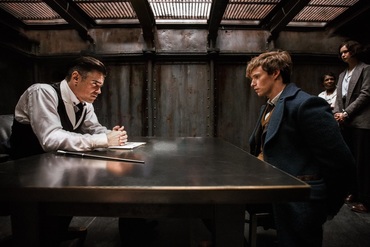Written by Kate McHargueTHIS IS THE EMERGENCY SPOILER ALERT SYSTEM...YOU ARE ADVISED TO READ AT YOUR OWN RISK... Rebellion is not a new theme, in film in general or in the Harry Potter series specifically. For years movie goers have been emboldened, impassioned, and inspired by on screen heroes who face insurmountable odds with sometimes little more than good intentions and a firm belief in right vs. wrong. Fantastic Beasts and Where to Find Them continues this tradition of unlikely heroes battling against tyranny and oppression, giving audiences a movie that is at once familiar and entirely new. Newt Scamander’s fight against fear mongering and oppression draws heartwarming parallels with our original wiz-kid hero, Harry Potter, and we are reminded of why we fell in love with the wizarding world in the first place. But in the midst of all the spellbinding magic and fantastic beasts, this movie manages to give us a terrifying portrait of Wizard/Muggle ignorance and the dangerous threat humanity poses to ourselves and the world we inhabit. The film follows two major “crises”; first, the wizarding world’s misunderstanding and subsequent mistreatment of magical creatures and second, the wizarding world’s fear of being exposed to the muggle world and the war, death, and destruction that would inevitably follow. Both play on important themes such as innate rights of existence (for animals and humans alike), the dangers of fear mongering, xenophobia, and segregation, etc. But while these overarching themes may upon first glance paint a simple portrait of good vs. evil, as J.K. Rowling does best, it is in the finer plot points and character developments that we see the complexities of her storytelling and ultimately her warnings against the “it’s us or them” mindset. There are the occasional small references to these larger issues throughout the movie; Newt’s remark about America’s backwards muggle and wizard relation laws, the hints at animal trafficking and species endangerment, the “Second Salem” society which draws direct parallels to the literal witch hunt that threw early inhabitants of America into a deadly frenzy, etc. And all of these little things are the foundation of the larger political message the film is building to. Ultimately, the film is an outline of how dictators (or in this case, dark wizards) are able to rise to power. The film opens with a montage of newspaper headlines which explain that Grindelwald (Voldemort’s predecessor) is wreaking war and destruction throughout Europe. We then jump quickly to Newt’s arrival in America, upon which we discover there is something magical loose in New York City that is threatening the wizarding world’s exposure to the no majs/muggles. What follows is a series of ignorant and fear driven decisions by the wizarding government that nearly lead to the destruction of the city and all-out war with the non-magic community or in other words, exactly what Grindelwald wants. It becomes clear that those in power, while trying their best to keep everything under control, are so intent on keeping a semblance of peace that they disregard the warning signs. They have been warned about the abusive woman who runs the Second Salem society but instead of taking action they demote the one witch who tries. They are warned that the murderous and destructive force raging through the city is an Obscura but they choose to believe that it is impossible and instead use Newt’s creatures as a scapegoat. Graves, who we presume is the head of magical law enforcement in America, sentences to people to death on the grounds that they might be working for Grindelwald and with no proof or trial is nearly able to carry out this sentence. It is a story we’ve unfortunately seen before in our Muggle world, those in power doing nothing until it is too late and those without power suffering for it. We could draw parallels from every infamous dictator in our history to the dark wizards of the wizarding world, and many have. If you don’t believe me, Google “Who Said It, Voldemort or …” This seems to be a lesson we never quite learn, a pattern doomed to repeat itself over and over again but given a new name each time so we can all retreat safely into the belief that somehow this time may be different. And once again, J.K. Rowling provides us with a tale that reminds us that evil and hatred may change its face, its name, its target, but it does not change its nature. For Harry’s generation there was Voldemort. For Newt’s there is Grindelwald. One can only hope that perhaps J.K. Rowling’s latest installment will teach us what it seems history cannot and that the planned next four films will continue to encourage our rebellious potential.
0 Comments
Leave a Reply. |
Archives
March 2025
|
|
© 2012-2025, Nerds That Geek LLC.
All Rights Reserved. |
uWeb Hosting by FatCow


 RSS Feed
RSS Feed